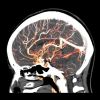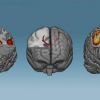-
 +18 +1
+18 +1Most of us have an inner voice, but some people don't.
Most of us have a constant inner conversation that helps with memory, motivation and problem-solving. So what happens if you are one of the minority who doesn't report inner speech? The issue took off on social media this week after the author of viral article wrote about his shock after discovering that some people don't have inner speech.
-
 +18 +1
+18 +1Could Psychopaths Have a Cerebral Advantage ?
There are a few things we take for granted in social interactions with people. We presume that we see the world in roughly the same way, that we all know certain basic facts, that words mean the same things to you as they do to me. And we assume that we have pretty similar ideas of right and wrong.
-
 +17 +1
+17 +1Why you don’t know your own mind
The scientific work that I do on the brain basis of consciousness is sometimes misunderstood - a misunderstanding which I think comes mainly from the political divide between mystics and materialists. I am a materialist, and reactions to my work tend to follow along the lines of: ‘keep your scientific hands off my consciousness mystery’.
-
 +4 +1
+4 +1Listening to music while driving reduces cardiac stress
Stress while driving is a risk factor for the development of cardiovascular disease and sudden cardiac complications such as heart attack (myocardial infarction), according to studies published in recent years. Selecting suitable driving music may be one way to mitigate this risk.
-
 +15 +1
+15 +1When We Fail 15% Of The Time We Learn The Fastest
To learn new things, we must sometimes fail. But what’s the right amount of failure? New research led by the University of Arizona proposes a mathematical answer to that question.
-
 +18 +1
+18 +1Bad News for the Highly Intelligent
There are advantages to being smart. People who do well on standardized tests of intelligence—IQ tests—tend to be more successful in the classroom and the workplace. Although the reasons are not fully understood, they also tend to live longer, healthier lives, and are less likely to experience negative life events such as bankruptcy.
-
 +13 +1
+13 +1Do Mirror Neurons Help Us Feel Empathy?
In 2000, prominent neuroscientist V. S. Ramachandran wrote that mirror neurons would do for psychology what DNA did for biology (Ramachandran: 2000). Although he has since admitted that this was an overstatement, mirror neurons have still contributed a lot to our understanding of how the brain works in social situations- especially those that require empathy. But how?
-
 +3 +1
+3 +1Emotionally Extreme Experiences, Not Just “Positive” or “Negative” Experiences, Are More Meaningful in Life
What does it take to live a meaningful life? In trying to answer this question, most researchers focus on the valence of the life experience: is it positive or negative? Researchers who focus on positive emotions have amassed evidence suggesting that we are more likely to find more meaning in our lives on days when we experience positive emotions. In contrast, researchers taking a meaning-making perspective tend to focus on meaning in the context of adjustment to stressful events.
-
 +16 +1
+16 +1Religious involvement may improve cognitive health
People over 50 who attend religious services and pray privately may notice better memory performance, a new study from the University of Michigan found. According to the study’s findings, frequent religious service attendance and private prayer was linked to stronger cognitive health among blacks, Hispanics and whites.
-
 +14 +1
+14 +1Is it okay to not be passionate about anything?
When she was asked what her passions were, Karen Hardy struggled to come up with an answer. Is that such a bad thing?
-
 +9 +1
+9 +1Getting it Right About Antidepressants, CCHR and a Global Concern About Psychiatric Drug Dependency and Risks
There are global concerns about a growing dependency upon a biological approach to treating mental health issues.
-
 +8 +1
+8 +1Higher Intelligence And An Analytical Thinking Style Offer No Protection Against “The Illusory Truth Effect”
It’s a trick that politicians have long exploited: repeat a false statement often enough, and people will start believing that it’s true. Psychologists have named this phenomenon the “illusory truth effect”, and it seems to come from the fact that we find it easier to process information that we’ve encountered many times before. This creates a sense of fluency which we then (mis)interpret as a signal that the content is true.
-
 +25 +1
+25 +1Psychological reasons behind the lack of focus in the work
A job is boring or monotonous when it ceases to become interesting to the individual performing. Monotony is not a characteristic of a particular job. It is characteristic of the worker and the job at a particular time. A job that looks boring or monotonous to one individual may arouse the interest of another individual.
-
 +7 +1
+7 +1The way music moves us shows the mind is more than a machine
The 55 Bar in Greenwich Village, with its bulging ceiling tiles and strings of fairy lights taped haphazardly to the walls, looks more like the clubhouse of a rural Irish sports team than a New York City jazz venue. Yet some of the musical experiences I’ve had in that dingy basement have bordered on the otherworldly. When I’m pinned to the back of my seat by the mind-warping rhythms of a drummer, or the harmonic ingenuity of an improvising guitarist, I often have the feeling that my body ‘gets’ things in a way my brain can’t.
-
 +25 +1
+25 +1Why your brain doesn’t register the words ‘climate change’
Which phrase does a better job of grabbing people’s attention: “global warming” or “climate change”? According to recent neuroscience research, the answer is neither. If you want to get people to care, try “climate crisis,” suggests new research from an advertising consulting agency in New York. That phrase got a 60 percent greater emotional response from listeners than our old pal climate change. (It must be music to the ears of Al Gore, who uses the phrase in just about every other tweet.)
-
 +11 +1
+11 +1People’s Sense Of Control Over Their Actions Is Reduced At A Fundamental Level When They’re Angry Or Afraid
During major bouts of anger or fear, people can end up taking extreme and sometimes violent actions. But they often say that, in the moment, they didn’t feel responsible for those actions – they “lost control” or “saw red”. In the UK, under certain circumstances, a person accused of murder can even claim that this “loss of control” led to them killing their victim. If successful, this defence can reduce charges to manslaughter.
-
 +18 +1
+18 +1Could Your Immune System Be Making You Impulsive?
You can have £10 today or £12 next week. Which do you go for? Being able to forego a reward now in favour of gaining something better later is known to be important in determining all kinds of desirable outcomes in life, including greater educational attainment, social functioning and health.
-
 +4 +1
+4 +1How and why did religion evolve?
“This is my body.” These words, recorded in the Gospels as being spoken by Jesus during the Last Supper, are said daily at Church services around the world before the communion meal is eaten. When Christians hear these words spoken in the present, we’re reminded of the past, which is always with us, which never goes away.
-
 +13 +1
+13 +1Train your brain, change your brain
“We knew that the brain has an amazing ability to adapt itself, but we were not sure that we could observe these changes so quickly. Understanding of how we can impact on brain wiring and functioning is the key to treat neurological disorders”, says Theo Marins, a biomedical scientist from IDOR and the Ph.D. responsible for the study.
-
 +45 +1
+45 +1'My mind's eye is blind' - ex-Pixar chief
The former president of Pixar and Walt Disney Animation Studios says he has a "blind mind's eye". Most people can close their eyes and conjure up images inside their head such as counting sheep or imagining the face of a loved one. But Ed Catmull, 74, has the condition aphantasia, in which people cannot visualise mental images at all. And in a surprising survey of his former employees, so do some of the world's best animators.
Submit a link
Start a discussion




















